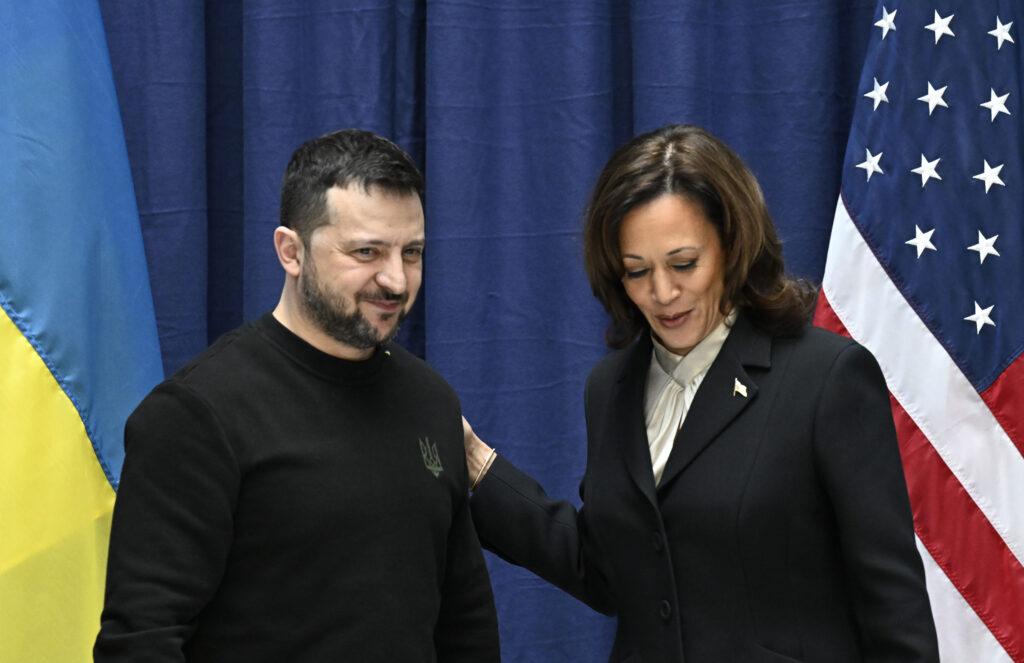
President Joe Biden’s administration has repeatedly made clear its desire to end the country’s involvement in foreign conflicts across the globe and to stay out of new ones, but its cautious approach has only served to embolden its adversaries.
In various conflicts throughout his time as president, Biden has routinely and publicly said what the United States’s response likely would include if an adversary acted against U.S. interests. But that, in turn, has allowed those enemies to push those limits without the fear of the most consequential response. The pattern dates back to the U.S.’s withdrawal from Afghanistan, reared its head again when Russia invaded Ukraine, and has been on display in the Middle East following Hamas’s Oct. 7, 2023, terrorist attack in Israel that ushered in heightened tension and threatened a full-blown regional war.
The administration is “more often than not self-deterred, and so I think it’s hard to deter others when you’re self-deterred,” former Secretary of Defense Mark Esper told the Washington Examiner.
The Biden administration followed through with the Trump administration’s Doha Agreement, which was a deal with the Taliban that mapped out the U.S.’s exit from Afghanistan. Biden administration officials claimed their hands were tied and they were forced to follow the previous agreement even though others have argued that the Taliban had not lived up to their side of the deal, so the U.S. shouldn’t have either.
Biden warned on July 8, 2021, that had he decided to go back on the Doha Agreement, “the Taliban would have again begun to target our forces,” and he said the Taliban’s takeover of Afghanistan was “not inevitable.” The Taliban captured Kabul five weeks later, only two weeks ahead of the U.S.’s withdrawal date at the end of the month.
Although the president was able to achieve a campaign promise of ending the war, it bolstered the impression that the Biden administration did not want to get involved in international conflicts.

Just months after the chaotic Afghanistan withdrawal, the administration warned about the possibility of a Russian invasion of Ukraine. Biden, however, indicated there may be a less significant response “if it’s a minor incursion,” and he took the possibility of U.S. military involvement off the table.
“If you recall, [Biden] talked about, ‘Well, it depends on whether it’s a minor invasion or something bigger,’ and he also took the notion of U.S. forces off the table early on,” Esper told the Washington Examiner. “So, I think there were some missteps or mis-messaging that, coupled with the terrible withdrawal from Afghanistan … [Russian President Vladimir] Putin perceived that the United States and the West would not push back.”
In addition to the initial self-deterrence, in the subsequent two years, the U.S. has not met all of Ukraine’s military requests, often declining to meet the most sophisticated ones. However, on multiple instances, the U.S. ultimately reversed its opposition, only to provide Ukraine with the weapons it requested months earlier. This happened with the Patriot missile defense systems, tanks, and fourth-generation aircraft, the last of which Ukraine still does not have.
“The Biden administration’s initial effort [was] to deter from invading, and I think they failed,” Matthew Kroenig, senior director of the Atlantic Council’s Scowcroft Center, told the Washington Examiner. “Biden said a minor incursion might be OK. He said that the United States would not get involved militarily. He said the consequences would be we’d provide arms to Ukraine, we’d sanction Russia, [and] reinforce NATO. There’s really no reason to believe that should have been enough to deter Putin.”
U.S. officials explained their caution as a concern that Russia could perceive their aid as an act of escalation and the U.S.’s introduction into the war.
Similarly, Robert Gates, who served as defense secretary under Presidents George W Bush and Barack Obama, expressed his concern on Wednesday during a Washington Post Live event: “The U.S. decision-making process in providing more advanced weapons to Ukraine has been deliberative, slow, and often too late.
“I think we’ve been slow to provide the kind of weaponry that that could have made a difference,” Gates said.

The same strategy of ruling out more extreme responses has reared its head again in the Middle East. For months, U.S. officials have said they do not want to see a regional conflict or a war with Iran. That goal has influenced the way the administration has responded to Iranian proxies’ continued attacks.
Iranian-supported militias in Iraq and Syria have launched more than 180 attacks on U.S. forces in those countries and Jordan, which have resulted in the deaths of three U.S. service members. The U.S. responded more forcefully in early February following the deadly attack on the small U.S. military base known as Tower 22 in northeast Jordan, and the militias have not carried out an attack against U.S. troops since Feb. 4.
The Iranian-backed Houthis, based in Yemen, have carried out more than 30 attacks on commercial vessels in the waterways off Yemen’s coasts, forcing global shipping companies to reroute their shipments on longer voyages. Despite multiple rounds of U.S. and U.K. airstrikes, the Houthis have continued their attacks, and they increased in frequency this week.
There is “continued talk coming out of the administration with regard to Iran and what’s happening in the Middle East and this constant concern about widening the war, constant messaging about we’re not looking for a war with Iran, a hesitancy in the wake of the killing of the three service members at Tower 22 to really strike back hard at the Iranians outside of Iran,” Esper said.
The Biden administration reiterated its warning of the growing military partnership between Tehran and Moscow. The U.S. has warned that Iran may provide Russia with hundreds of ballistic missiles, though officials have not seen evidence of a transfer yet. Tehran provided Moscow with hundreds of one-way attack drones earlier in Russia’s war in Ukraine.
CLICK HERE TO READ MORE FROM THE WASHINGTON EXAMINER
If Biden wins reelection in November, and he continues “to fear escalation above all else,” Kroenig said, “then they’re essentially going to hand the keys to the international system to our most ruthless adversaries that are willing to use military force.
“So, I would see no reason for Iran to scale back its proxy attacks in the Middle East, and I think [Chinese President] Xi [Jinping] is going to be tempted to invade Taiwan,” Kroenig added. “That could lead to a broader regional conflict that includes Korea, so I do really see a lot of parallels between where we are today and where we were in 1938, and I think World War III, unfortunately, is very much possible.”





